By Dr. Jarrod Sadulski, Faculty Member, Criminal Justice, American Military University
Belize is a small nation in Central America with a population of around 390,000. As in other countries, crime is a problem in Belize. According to the Central Intelligence Agency, Belize has high crime rates and is experiencing growing involvement in the South American and Mexican drug trade.
The Belize Central Prison houses the nation’s inmate population. The approach and strategies that have been put into place by the prison’s leadership have had a profound impact on reducing recidivism and helping to improve inmates’ lives.
[Related: What Makes Reentry Initiatives Successful at Reducing Recidivism]
Belize Central Prison’s recidivism or re-offending rate is only 10 percent. According to the U.S. Bureau of Justice Statistics, the recidivism rate in the United States was found to be as high as 83 percent. Mexico, which borders both Belize and the United States, has a recidivism rate of between 80 and 90 percent.
Visiting Belize Central Prison
I recently visited Belize as a guest speaker at the invitation of Galen University, one of Belize’s leading universities. During my visit, I had the opportunity to visit Belize Central Prison. I had an interest in the prison because of my research into its successes with inmate rehabilitation and I wanted to see what Belize Central Prison was doing differently from other prisons around the world.
Upon arrival, I met Virgilio Murillo, the prison’s Chief Executive Officer. One of the first things I noticed that sets Belize Central Prison apart from other prisons is that it is a faith-based, non-profit institution, privately operated by the Kolbe Foundation for the government of Belize.
Mr. Murillo explained that the Kolbe Foundation took over management of the prison in August 2002 in an attempt to change the deplorable conditions that had existed there. Previously, Belize Central Prison had only 300 beds and housed 900 inmates. There were over 50 prison escapes per year.
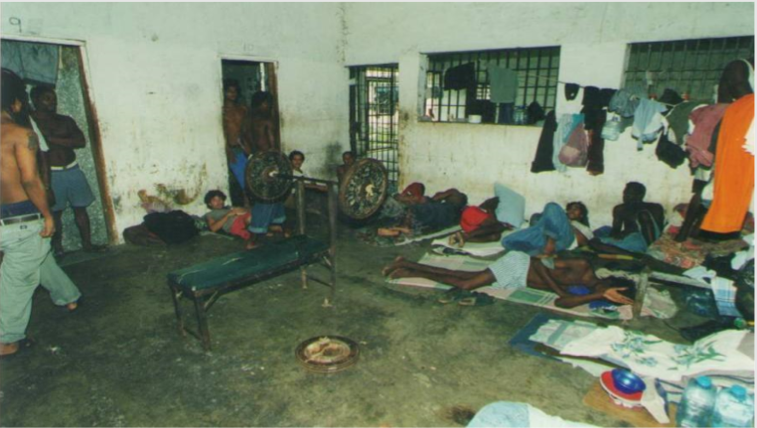
Also, prior to the Kolbe Foundation, the prison was riddled with corruption and housed juveniles with adults, which led to victimization. It was also a breeding ground for disease due to unsanitary conditions.
When I walked through the prison on February 28, it was clear that a total reformation had taken place. I saw 25 inmates outside the prison walls cutting down long grass with machetes near a small pond.
Only one guard was overseeing them. Clearly, they were no flight risk or danger to the guard.
Inside the prison, I asked Mr. Murillo, who has been with the Kolbe Foundation since the takeover in 2002, how conditions had improved so drastically and how the recidivism rate had dropped to a level that should be the envy of the world.
Belize Central Prison Improved through Management Service Contract with Belize’s Government
Mr. Murillo, who has been with the Kolbe Foundation since the 2002 takeover, explained that the prison is operated through a management services contract with the government of Belize. The prison receives only $14 per day per inmate, which is equivalent of $7 per day per inmate in U.S. currency. To put that figure into perspective in terms of limited resources, the average daily cost per prisoner in the United States is $99.45, according to the Bureau of Prisons.
Despite a limited budget and a recidivism rate that is astoundingly low, the Kolbe Foundation has been responsible for a 186 percent drop in escapes, a substantial drop in contraband smuggled into the prison, and a reduction of prison incidents.
The charts below reflect the successes of the Kolbe Foundation in reducing contraband:
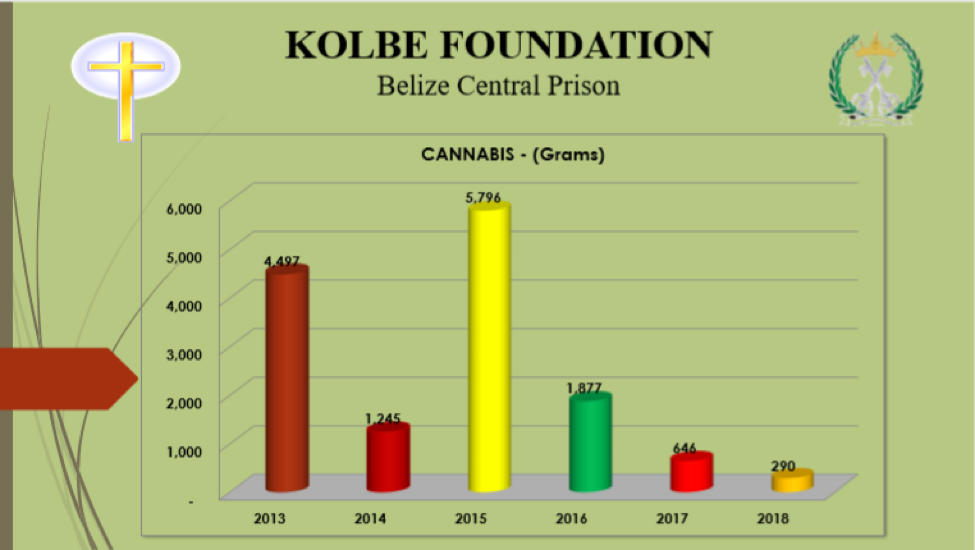
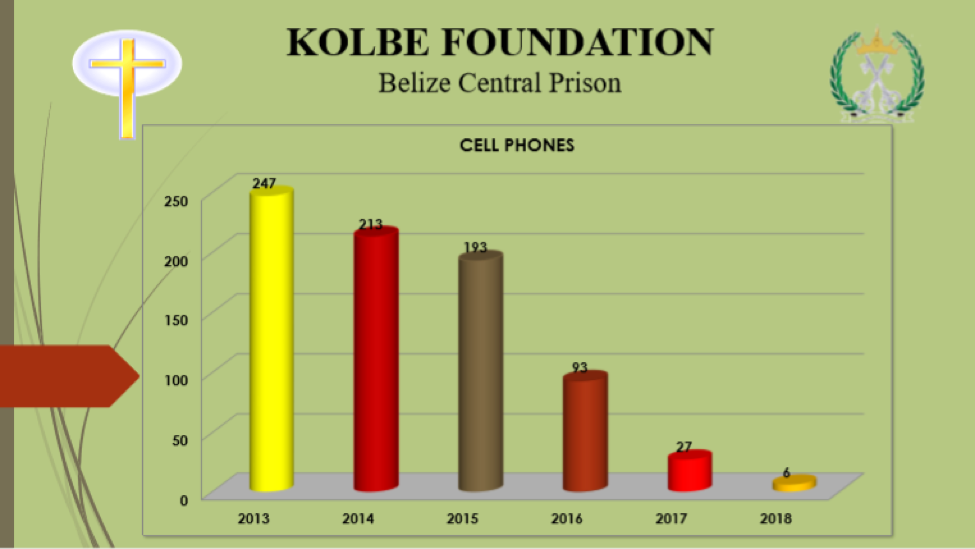
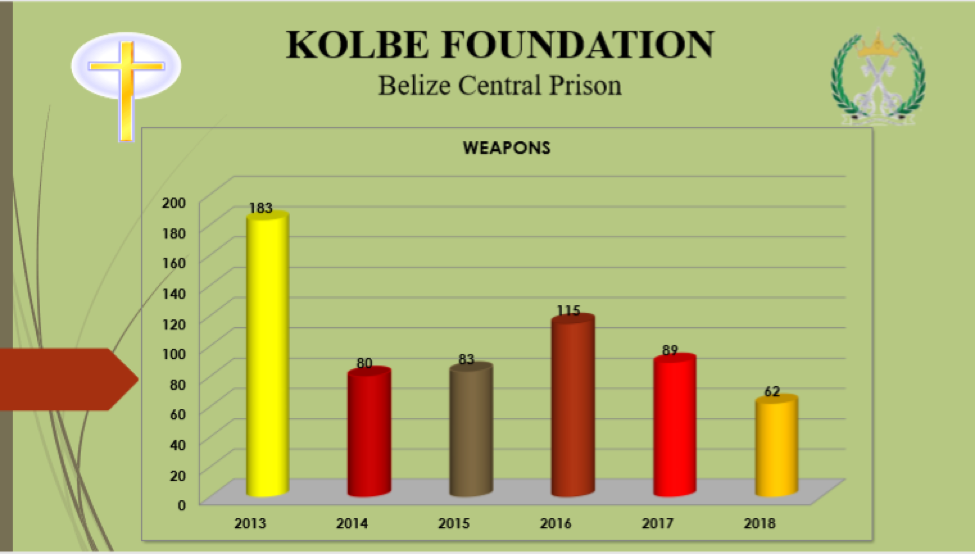
The chart below shows the declining headcount at Belize Central Prison, which reflects its success in lowering recidivism the past six years.
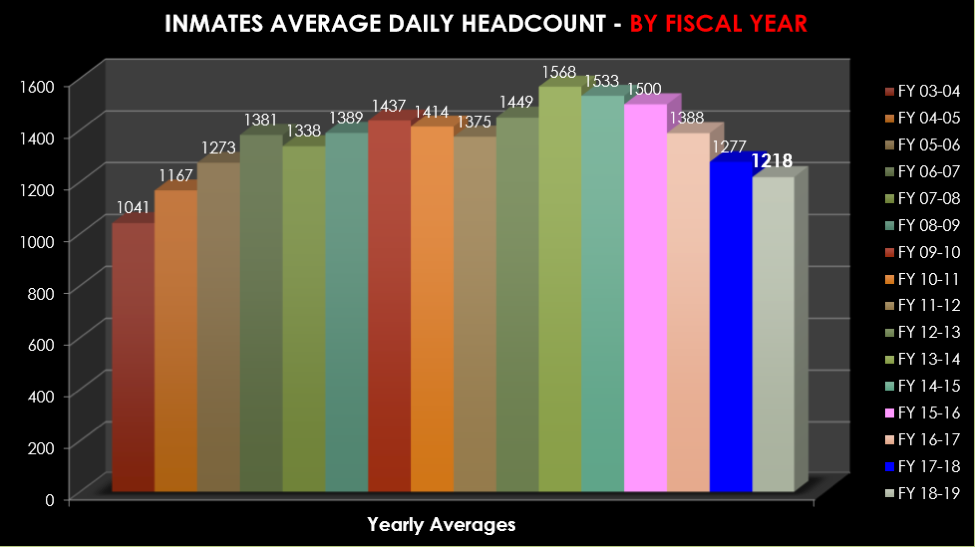
Belize Central Prison Uses Faith-Based Strategies to Motivate Inmates
Faith-based strategies to improve prison conditions and the lives of inmates are visible throughout Belize Central Prison. For example, a prison radio station broadcasts messages to inmates throughout the day that are designed to help build character. These broadcasts include motivational speakers and inmates who provide testimonials about their success in rehabilitation in Belize Central Prison and the life lessons that inmates have learned.
The faith-based series “Unshackled” is an award-winning radio program from Pacific Garden Mission in Chicago, which airs relevant stories by those who have successfully reformed their lives. The series is broadcast through the prison’s radio station. Church services for inmates are offered seven days a week.
Belize Central Prison Helps Inmates Overcome Drug Addiction
Highly structured rehabilitation programs such as the prison’s Addiction Rehabilitation Center and other successful programs exist throughout the prison. These programs conclude with a graduation ceremony and a certificate that can be shown to future employers.
In addition to helping inmates overcome addiction, these programs provide inmates with a sense of accomplishment and tools to help them succeed once they are released. I had the opportunity to sit in during an Addiction Rehabilitation Center counseling session. The success of the Kolbe Foundation’s mission to provide a humane facility geared toward meaningful rehabilitation and successful integration back into society was clearly evident.
[Related: How the VADOC has Reduced Recidivism Using the Cognitive Community Model]
I listened to the stories of inmates who discussed their lives before prison and how the guidance and support they have received has changed their lives. One inmate discussed his life of drug abuse, which led him to commit robberies to feed his habit. His pride in his success of defeating addiction while in Belize Central Prison was clear and was accompanied by his sincere commitment to avoid falling back into his old ways once he was released.
Guards Trained in Professionalism and Moral Courage
Maintaining professionalism among the prison guards was very important to Mr. Murillo. This is accomplished by consistent training, accountability, and weekly meetings where prison management reviews the mission, values, and general orders of the prison.
Mr. Murillo explained that focusing on moral courage with the prison staff has led to a dramatic reduction in corruption and drug contraband entering the prison. His position is “treatment is the key.”
Prison Seeks Feedback from Prisoners and Maintains Atmosphere of Mutual Respect between Guards and Inmates
To keep the pulse of what is going on in his prison, Mr. Murillo holds weekly inmate advisory committee meetings during which selected inmates candidly discuss with him trends and issues within the inmate population.
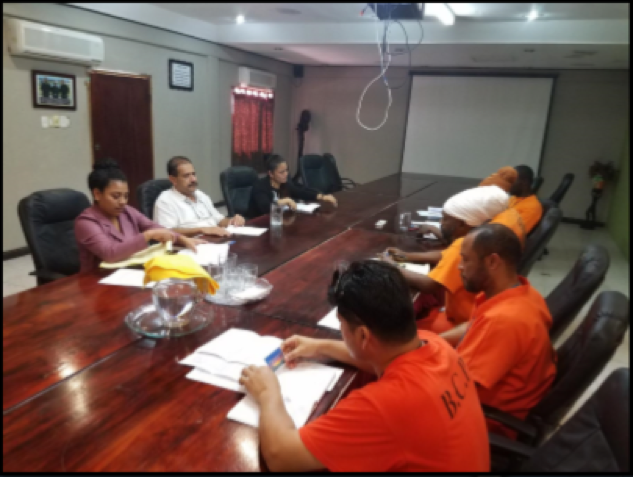
Throughout the tour, I could see the mutual respect between inmates and prison staff. Walking through the main yard while inmates were playing soccer on their daily three-hour recreation time, there was a sense of safety within the prison. In a prison that houses 104 gang members, including members of MS-13, 18th Street, and the Crips and Bloods, security and order are maintained through proper and humane treatment. Prison management provides motivational sessions in rooms filled with inmates as noted below, which reflects the success the prison is having in prisoner reform and the mutual respect that exists.
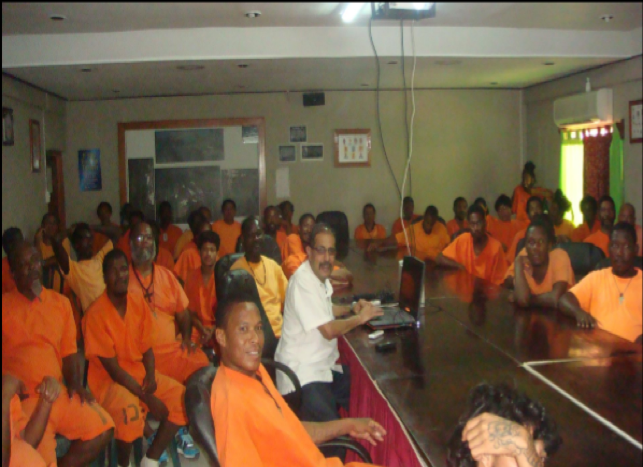
Inmates Taught Trade Skills for Life after Prison
I also visited the prison’s industrial zone where inmates are taught various trade skills by visiting craftsmen and fellow inmates, including woodworking, agriculture, tailoring, livestock management, construction, welding, electrical work, and even entrepreneurialism. The pride and satisfaction the inmates had for their work was evident as they were quick to show me the crafts and skills they had learned. The prison has a gift shop outside the gates that displays and sells some of the inmates’ woodwork.
Despite limited resources, the prison is committed to providing rehabilitation with a faith-based focus on developing moral character, integrity, and thought change. In addition, the emphasis on teaching skills that inmates can apply to the workforce immediately upon release is likely to account for Belize Central Prison’s low recidivism rate. The nation of Belize has benefited tremendously from the efforts of Virgilio Murillo and his staff as well as the Kolbe Foundation.
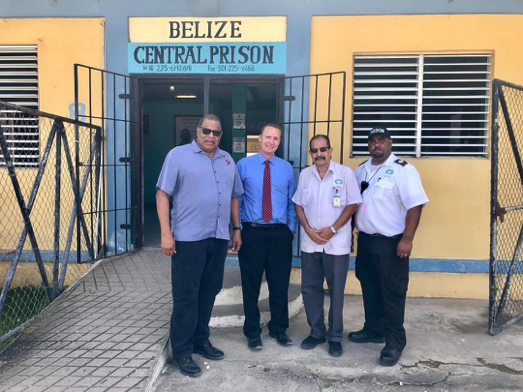


Comments are closed.